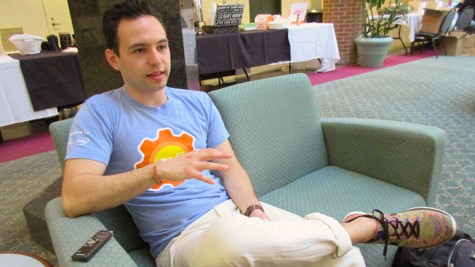32 hours. 200 hackers. No sleep to speak of. It’s tribeHacks ’16!
Members of William & Mary’s Association of Computing Machinery are rebooting tribeHacks, a 32-hour coding marathon April 1-3 in Small Hall.
Ulises Giacoman ’16 says that 240 hackers are registered and he and his committee expect at least 200 participants to show up, with about half that number coming to Williamsburg from outside the region.
Giacoman is the ACM’s hackathon chair and a member of the William & Mary team that recently won $20,000 in scholarships by taking first prize at HackU 4, a hackathon sponsored by Dominion Enterprises.
Hackathons are intense coding marathons, in which teams try to build the best app, web component or hardware enhancement. This year’s venue will allow hackers to use the Small Hall makerspace for soldering or other hardware work.
“The great thing about a hackathon is that it’s an compressed experience. There’s a time constraint for you to build something, to learn something, but you also have a team,” he said. “You can spend a weekend by yourself learning a new technology, but at a hackathon, you are doing this alongside other developers.”
Like many hackathons, tribeHacks will be a competition among teams of up to four hackers each. Giacoman said sometimes teams show up already formed, but many teams are formed right at the event. Check-in for tribeHacks is at 6 p.m. on Friday, April 1 and the event ends following the closing ceremony at noon Sunday, April 3, at which the top five hacks will be presented. In between are seminars on various topics, meals—and not much sleep, if any.
The other members of this year’s hackathon committee are Nathan Owen ’17, Divya Bathey ’16, Alexina Haefner ’19, Eryn Sawyer ’17, Jacob Lisi ’16 and Will Theuer ’17, all student members of the university’s chapter of the Association of Computing Machinery. William & Mary’s undergraduate ACM membership is about 70, mostly majors in the Department of Computer Science. Giacoman says the primary goal of the ACM@WM is to enhance and supplement the academic technical education students receive with events such as hackathons, tech tutorials, interview preparation and programming competitions.
Sponsors are important and active participants in any good hackathon. Giacoman explained that sponsors set up tables to connect with participants. “Sponsors use hackathons for recruiting,” he said, as reps from tech companies circulate among the student coders, checking out who has potential.
Sponsors also can serve as on-the-spot resources at hackathons, often bringing in a team of their own specialists to help hacking teams through any rough coding patches
Giacoman and his fellow tribeHack organizers have also been successful in drumming up support for the event, securing nearly 30 sponsors, including STR Software, Dominion Enterprises and Adobe and William & Mary’s own AidData. He explained the sponsor support allows the committee to present tribeHacks at no cost to the participants.
“Basically, what we’re providing to the students are food, a place to sorta sleep and a chance for them to just be able hack, whether that’s web apps, mobile apps or hardware hacks,” Giacoman explained. He added that tribeHacks also is arranging transportation reimbursements for off-campus participants.
Some hackathons have themes, but tribeHacks is an open hackathon. Giacoman noted that the event is sanctioned by Major League Hacking, the official student hackathon league. In accordance with MLH guidelines, tribeHacks is a collegiate-level even. Spectators, including high school students, are welcome to visit tribeHacks, but all hackers must be college students.
“We’ll be checking IDs,” Giacoman said. “College IDs.”















